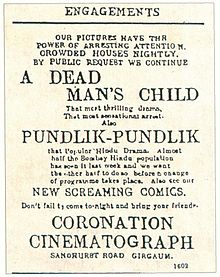Dadasaheb Torne
The distinction may lie with the fact that, unlike Phalke, Torne sent his film overseas for processing.
Ramchandra Gopal Torne was born on 13 April 1890 in Malwan village on the western Indian Konkan coast near Mumbai.
Following his father's death, the young boy and his mother were asked to leave the house by his uncle and they were forced to live in poverty.
At the age of 10 or 11, and with only four years of formal education behind him, Torne dropped out of school and headed to Mumbai.
This first Indian feature film was released on 18 May 1912 in Mumbai's Coronation movie theater.
Dadasaheb was an original director, special effects person, editor, sound recordist and a master of many other techniques now commonly used in modern movie-making.
He caught another young man there, Baburao Pai, and started releasing Hollywood movies in Karachi.
Due to the first World War in Europe, he established contacts in the United States of America.
He started importing all the relevant instruments required for the movie industry, like cameras, film etc.
A few years earlier, while working in the Royal Art Studio of Mumbai, he met Ardeshir Irani.
Within a span of two months, history was created: on 14 March 1931, India's first talkie, Alam Ara, was released in the Majestic Cinema Theater.
The first Silver Jubilee movie of the Indian film industry, it turned out to be legendary.
The company's second movie was Aout Ghatakecha Raja, which introduced Master Viththal (who later became famous as Indian Douglas) as director.
Many talented artists such as Mehboob Khan (Mehboob Studio), Kardar, Bhalaji Pendharkar, Vishram Bedekar, R. S. Chowdhary, C. Ramchandra, Jayashree, Ratnamaalaa (Dada Kondke's "Aaye") and Alam Ara heroine Zubeida were first introduced by him.
He made several movies later: Thaksen Rajputra, Chhatrapati Sambhaji, Krishnashishtai, Savitri, Raja Gopichand, Narad Naradi, Bhagva Zenda, Mazi Ladki, Navardev, etc.
The last movie of Saraswati Cinetone was Aawaj, released on 22 May 1942, starring Maya Banerji, Swarnalata and Waasti.
He had built a studio in Pune, which was sold to Chakan Oil Mill and today where Kumar Pacific Mall stands.
In 1947, when he had gone out of town for some work, his colleague and friend stole all the movie cameras and other expensive equipment and took it to Pakistan.
